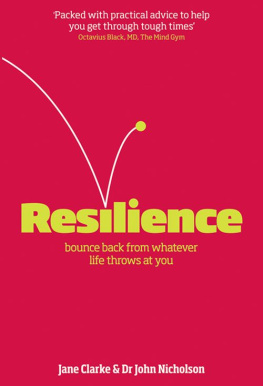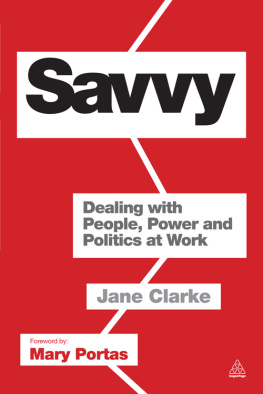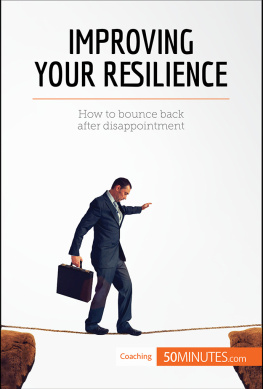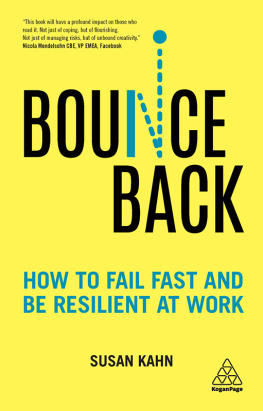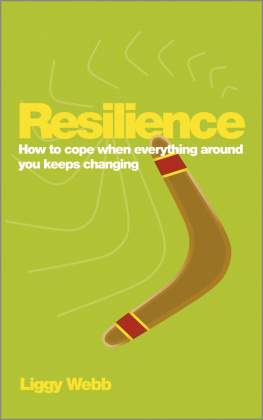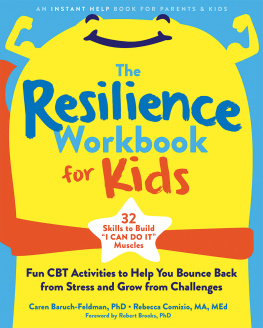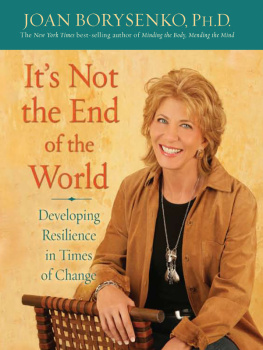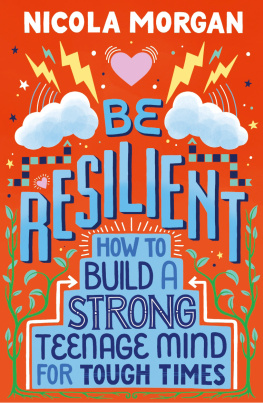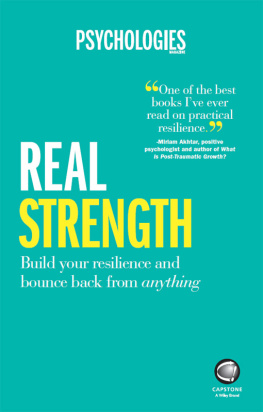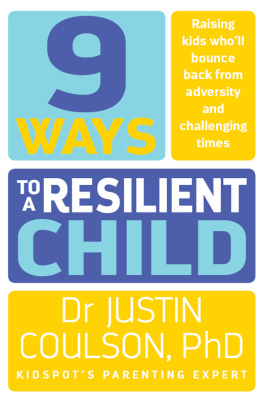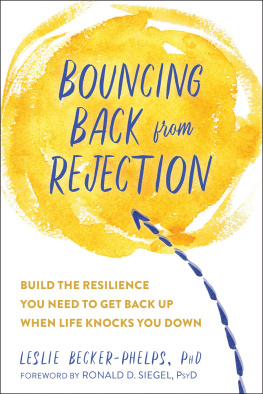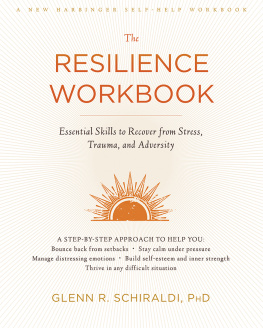Resilience
bounce back from whatever
life throws at you

Resilience
Jane Clarke and John Nicholson, 2010
This First edition is published in 2010 by Crimson Publishing
Crimson Publishing, Westminster House, Kew Road, Richmond, Surrey TW9 2ND
The right of Jane Clarke and John Nicholson to be identified as the authors of this work has been asserted by them in accordance with the Copyright, Designs and Patents Act 1988.
Epub edition 2010, ISBN: 978-1-85458-644-5
British Library cataloguing in Publication data
A catalogue record for this book is available from the British Library
All rights reserved under International and Pan-American Copyright Conventions. By payment of the required fees, you have been granted the non-exclusive, non-transferable right to access and read the text of this ebook on-screen. No part of this text may be reproduced, transmitted, downloaded, decompiled, reverse engineered, or stored in or introduced into any information storage and retrieval system, in any form or by any means whether electronic or mechanical, now known or hereinafter invented, without the express written permission of Crimson Publishing ebooks.
Epub file created by RefineCatch Limited, Bungay, Suffolk
For Sarah and Flora, whose resilience is more than a match for ours.
Our greatest glory is not in never falling, but in rising up every time we fall.
Confucius
Success is not final, failure is not fatal: it is the courage to continue that counts.
Winston Churchill
Contents
Part 1: Understanding resilience
Chapter 1:
Chapter 2:
Part 2: Being resilient
Chapter 3:
Chapter 4:
Chapter 5:
Chapter 6:
Chapter 7:
Chapter 8:
Chapter 9:
Chapter 10:
Part 3: Becoming more resilient
Chapter 11:
Acknowledgements
Many of the ideas in this book were developed in conversations with colleagues at Nicholson McBride, notably Sandra Aldridge, Alyse Ashton, Charles Barlow, Kate Brown, Des Christofi, Ruth Colling, Helen Fisher, Emily Frohlich, Nick Kambitsis, Rubina Patel, Emma Seward, Brian Stansbridge, Kath Timmins and Geraldine Ward. Jon Bennett, Jamie Hollyhomes and John Southwell of the talent management company ETS were our partners in developing the Nicholson McBride Resilience Questionnaire (NMRQ), ably assisted by Kate Graysons knowledge of SPSS. Thanks are also due to David Lester, Sally Rawlings and Lucy Smith at Crimson, and to Sharon Walker and Susannah Lear.
Our major debt, however, is to a group of 26 people who were kind enough to participate in a series of structured, in-depth interviews. Membership of this group referred to throughout the book as the R-team (or interviewees) was as follows:
Haydn Abbott Chief Executive, Angel Trains International
Alex Allan Chairman, Joint Intelligence Committee; Permanent Secretary, Cabinet Office
David Andrews Founder and Chief Executive, Xchanging plc; member of the Supervisory Board, Deutsche Brse
James Bardrick Co-Head of Banking, Europe, Middle East and Africa, Citigroup
Virginia Beardshaw Chief Executive, I CAN childrens charity
Baroness Tessa Blackstone Vice Chancellor, Greenwich University
Alan Buckle Global Head of Advisory, KPMG
Ted Burke Chief Executive, Freshfields Bruckhaus Deringer
Sir Andrew Cahn Chief Executive, UK Trade & Investment
Richard Cuthbert Chief Executive, Mouchel Group plc
Alistair Da Costa Managing Director (Asia), DLA Piper
Amelia Fawcett Chairman, Guardian Media Group and Pensions First Group LLP
Joe Giannamore Founder and Managing Principal, AnaCap
Ivan Gunatilleke Chief Financial Officer, Cable & Wireless, Worldwide
Dave Hartnett Permanent Secretary for Tax and Commissioner, HM Revenue & Customs
Katherine Maddock-Lyon Head of Customer Strategy & Transformation, London Borough of Barking and Dagenham
Peter Middleton Chairman, Syscap Ltd
Donald Moore Chairman, Morgan Stanley (Europe)
Charlie Parker Chief Executive, Oldham Council
Anthony Salz Vice Chairman, NM Rothschild; Chairman, the Eden Trust
John Smythe Founder and Chairman, Engage for Change
Deirdre Trapp Partner, Freshfields Bruckhaus Deringer
Professor Lorraine Tyler Head of Centre for Speech and Language, Cambridge University
Steve Varley Managing Partner, Markets, Ernst & Young
Sir David Walker Senior Advisor, Morgan Stanley; Vice Chairman, Legal & General
Rob Whiteman Chief Executive, London Borough of Barking and Dagenham
Members of the R-team provided many of the views and stories cited throughout the book, as well as some of the case studies. Quotes from them are (in most cases) presented in bold .
This is a book about resilience the ability to bounce back from tough times, or even to triumph in the face of adversity; to display tenacity, but not at the expense of reason.
From our earliest history, and across all cultures, the quality of resilience has been admired, even romanticized. While the heroes of fairy tale and literature have tended to be tall, dark and handsome, brave and true, they have also tended to be resilient, appearing at their best when most severely challenged. We are taught the story of the beleaguered Robert the Bruce, inspired by the efforts of a spider spinning its web if at first you dont succeed, try, try again.
But resilience has other resonances. In physics, resilience describes the process by which objects revert to their original shape after being bent or stretched. In medicine, it refers to the ability of individual patients to recover from injury or illness. For patients, this resilience may reflect differences in basic anatomy or physique (some of us, it seems, have good bones which make us naturally quick healers), but it also appears to reflect aspects of personality strength of will, say, or optimism; the miracle recovery made by the professional footballer or runner when faced with the prospect of missing a key sporting event, to take one well-known example.
With over 30 years experience working with individuals and organizations in a variety of difficult situations, we have our own understanding and appreciation of resilience. Over time, we have come to recognize that some people are simply less fazed by setbacks than others, clearly showing more resilience, whatever life throws at them, than others. Such people are able to recast their objectives, even reinvent themselves, according to the demands of the environment.
In our experience, such people also tend to:
Be open to new ideas (they are good listeners, keen learners and are prepared to try different approaches)
Assume the best rather than the worst of other people
Find opportunity and risk equally fascinating (recognizing that the link between the two is crucial to success)
Embrace positive change
See what needs to be done and be happy to lead the charge
Prefer dealing in transparency and honesty rather than obscurity and deceit
We have also noticed that people who display these characteristics usually have two other things in common they are energized rather than overrun by crisis, and other people actively choose to collaborate with them.
As soon as we started to think seriously about the concept of resilience, we realized that it might be a defining characteristic of many of the individuals whose approach to people and problems we most admire . We were keen to find out more, and to pass on what we learnt to others.
We intend to do this not by providing exhaustive academic analysis but by drawing on the experiences of real-life people in a variety of situations, people we have accessed either through our work or a wider network of contacts. In so doing, we hope to find answers to four key questions:

